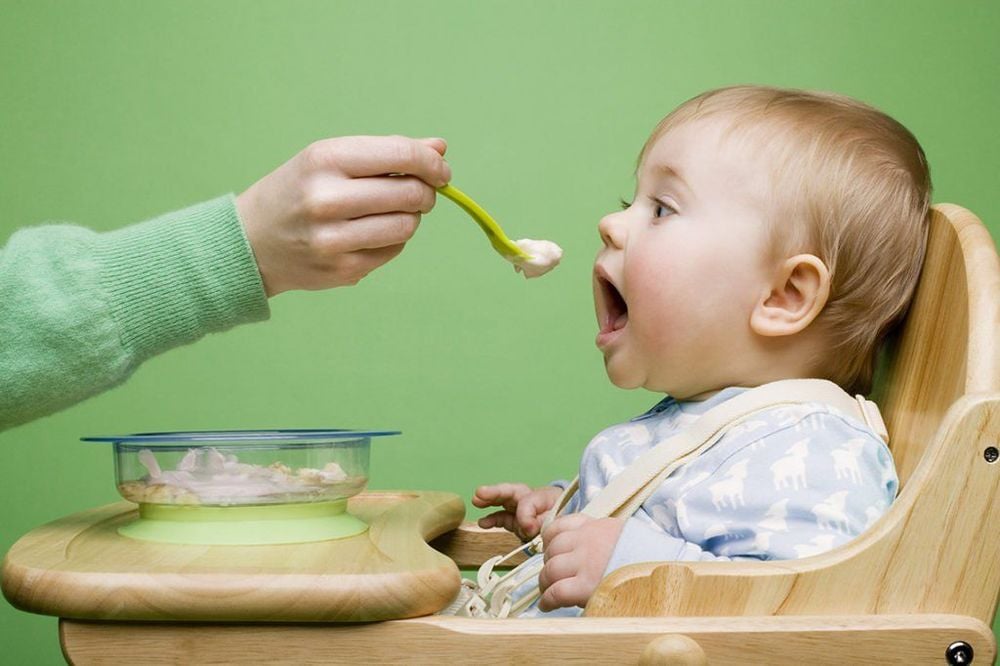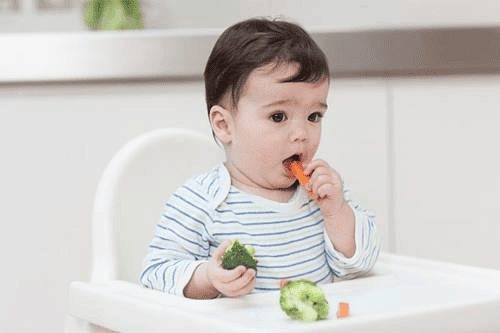This is an automatically translated article.
The article is professionally consulted by Master, Doctor Dang Huy Toan - Pediatrician - Neonatologist - Department of Pediatrics - Neonatology - Vinmec Nha Trang International General HospitalMost babies are lazy to eat solids and refuse food from time to time. Starting solid foods can sometimes be a little uncomfortable or new for both baby and parent. Therefore, if the baby is lazy to eat solid foods, parents should not be too worried.
1. Why is the baby lazy to eat solids?
There are many reasons to explain why babies are lazy to eat solids. However, parents need to know the fact that your baby is not the only one who is lazy to eat solid foods. Understanding why children are lazy to eat solid foods is the first thing that parents can do to completely solve this situation.Just like adults, children will gradually feel anorexia when their health is not good, sick or not eating well. So, if your baby has a cold, sore throat, or is teething, he may stop eating. Simply put, in this situation, the baby is too tired to eat.
On the contrary, if your baby is healthy and is breastfed or formula-fed, it is possible that he is not hungry. Babies' tastes change from day to day, even from meal to meal. Your baby may not always be as gluttonous as you would like. If your baby has a lot of night feeds, it will make her lazy to eat solids or not want to eat more solid foods during the day.
Another reason to explain baby's lack of weaning is because he doesn't like the taste or texture of food. While young children are usually happy to eat a variety of foods during the first few days of solids, older children are more likely to reject new tastes and textures. If you offer your child some foods that are new to him, he may refuse at first. Newborns tend to like sweet tastes, so they may refuse sour or bitter foods. This includes vegetables with a characteristic flavor like kale, brussels sprouts, or watercress. Even so, try not to repeat your baby's favorite foods. Instead, continue to offer a variety of foods to diversify meals and ensure children are still getting all of the essential nutrient groups. It's normal for your baby to be lazy to eat new foods with new foods, so be prepared for her to need to eat a new food 8 times before really accepting it.

Mệt, ốm có thể khiến bé lười ăn dặm
2. Measures to solve when the baby is lazy to eat solids
When the baby is lazy to eat solid foods, the solutions will be different and depend a lot on the age of the baby. You can try giving your baby solid foods at around 6 months of age. But all babies are different. Some babies can eat earlier and tend to enjoy trying new flavors and textures, while others do the opposite.Weaning is a gradual process. For the next few months, your baby will continue to get most of what he needs from regular milk, whether it's breast milk or formula. So, don't rush to start introducing solid foods as soon as your baby hits the 6 month mark.
The first possible step is to find out if your baby is really ready by asking the following questions:
Can your baby sit upright with support? Can the baby hold his or her head steady? Can your baby pick up objects by himself and bring them to his mouth? If the answer to all three is "yes", your baby is ready to start solids. If your baby is 6 months old and doesn't have enough of these signs, you should talk to your doctor. However, try not to worry, as all babies develop at their own pace.
If your baby is physically ready, but still doesn't seem interested in eating, the following tips may help:
Think about when you feed your baby: If the timing Weaning is that after a feed, your baby may be too full to try another food, so try offering it before a feed. You can give your baby milk later if he's still hungry. Conversely, when your baby is very hungry, she may be too bored to try something new. In this case, you can give your baby only a small amount of milk to reduce hunger, and then start feeding him again. Another tip to encourage solids is to let your baby imitate you. Have your child sit in a high chair next to you at the table while eating. Prepare a dish that you know your child can eat. If your child seems interested, share a portion of your meal with them. Parents can also create conditions for children to self-feed to stimulate: From 6 months old, you can give your baby soft foods. For example, you could try crustless toast with butter, slices of ripe, peeled fruit, or a piece of soft cooked carrot. If you want to spoon-feed your baby, you can try giving him a spoon of his own to play with while you feed him. If your baby is just lazy to eat solid foods with a particular food, you should try again and again! It can take a while to get your baby to like a new food, and you may need to offer it 10 or more times before your baby really enjoys it. Once your baby has tasted the food, clap and cheer to show him how happy you are. Children often love getting attention from others. It is natural that children do not eat much, but you should not worry too much. It's completely normal for babies to eat only a few spoonfuls or small amounts of food a day when they first start solids. If your baby continues to gain weight steadily, he's fine.
Feeding a little at a time is a good approach and introducing solids is a matter of patience, because:
Infant iron stores begin to deplete after 6 months. Newborns need to learn how to chew to help develop their voices. Infant growth can slow down if they rely solely on breast milk or formula after 6 months of age. If you have any concerns about your child's weight gain or just want some peace of mind, you can always chat with your doctor.

Để cải thiện tình trạng bé lười ăn dặm, bạn cần cân nhắc thời điểm thích hợp để bé ăn
3. Other tips and advice for lazy baby to eat solids
Watch the baby solids video for recipes that appeal to babies as well as tips from health professionals. Has your toddler suddenly become upset? Find out why sloths eat solids. If your baby will eat a few foods, but won't try anything else, learn to introduce new foods. See guidelines for weaning by stage of development to find out how much food your baby needs for each age. Pay attention to your child's cues. If your child turns his head away, doesn't open his mouth, spits food out, or holds it in for a long time, he's probably not hungry. If your baby pushes his or her food away, cries, screams, tries to climb out of his high chair, or tells you he doesn't want to eat, it's best to calmly finish the weaning and try again next time. other. Don't pressure your baby to eat and never force him to eat more. It can just make feeding more difficult and make mealtime stressful for both parties. It can cause children to obsess and give up certain foods altogether. Try to keep mealtimes relaxed. Avoid long meals that make your baby anorexic and irritable. Limit time for each meal to only 20 to 30 minutes is reasonable. Rest assured that a change in your baby's taste is nothing to worry about. It's rare for a sloth to eat solids because of a health problem, such as iron deficiency. However, you can always take your child to see a doctor if his poor appetite doesn't improve or he's not gaining weight.In addition to having a reasonable diet, choosing a reasonable time to eat weaning,... your baby should also be supplemented with necessary micronutrients such as: Zinc, selenium, chromium, vitamins B1 and B6, Ginger , acerola fruit extract (vitamin C), ... to improve taste, eat well, reach the correct height and weight, and exceed the standard, good immune system, enhance resistance to reduce minor illnesses as well as Fewer digestive problems.
To have more knowledge about taking care of children according to age, please visit the website (vinmec.com) regularly and make an appointment with the leading doctors, Pediatricians - Nutrition experts when you need advice.













